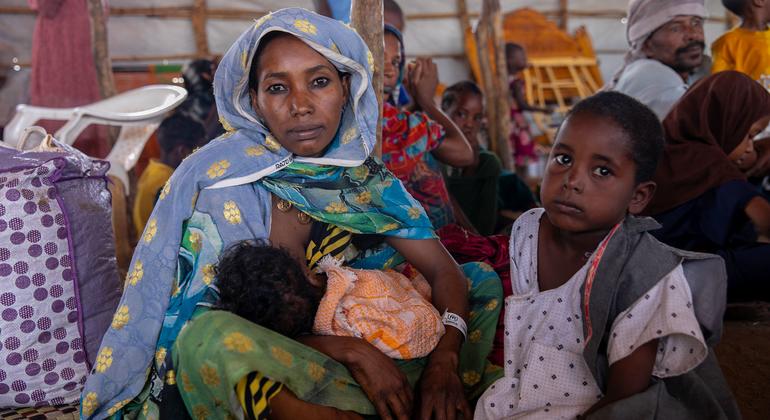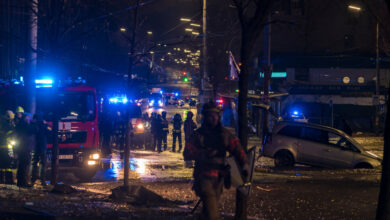World news summary: Sudanese refugee crisis, UNRWA update on Gaza, rising violence in South Sudan, latest US call for a moratorium on executions


In the first week of October alone, nearly 25,000 people fled to eastern Chad, marking the highest weekly migration this year. This follows Months of rising violence in Darfurand Chad currently hosts more than 600,000 Sudanese refugees, more than any other country in the region.
Since the conflict began 18 months ago, Nearly three million refugees have fled Sudanseek safety in countries such as the Central African Republic, Egypt, Ethiopia, Libya, South Sudan and Uganda.
Inside Sudan, International Organization for Migration (IOM) reported that in the first half of October alone, nearly 40,000 people were displaced. The total number of internally displaced people has now reached nearly 8.2 million people.
Critical time for aid
As rainfall gradually subsides, aid organizations are rushing to deliver essential supplies to the hardest-hit areas. OCHA is calling on all sides to stop fighting, protect civilians and facilitate humanitarian access. In Chad, Birak Health Center is overwhelmed by the influx of refugees, and lack of funding has slowed the provision of essential services.
Meanwhile, the cholera outbreak continues to get worse, with more than 24,000 reported cases and 700 deaths since mid-July. United Nations Refugee Agency, UNHCRis working to resettle refugees and provide large-scale vaccination services, but funding remains limited.
Gaza: Aid is available but cannot reach those in need
There are currently 100,000 tons of food waiting to be imported into Gaza by the World Food Program and the United Nations Palestinian refugee agency (UNRWA), with enough food to last everyone for the next three to four months, said UNRWA Representative Scott Andersen interacted with journalists at United Nations Headquarters in New York on Wednesday.
However, according to Mr. Anderson, while the supply exists, the environment to supply it does not exist.
“It’s difficult to get aid to the people,” he said, pointing out that before Israel’s Rafah offensive in May, there were 350 trucks arriving every day — a number that has since dropped to 30 trucks. on a beautiful day.
UNRWA is working closely with the Israel Defense Forces (IDF) to try to create a more favorable environment for aid workers to bring in supplies, but “we’re not quite there yet,” Mr. Anderson said. speak.
In Northern Gaza, about 470,000 people remain there amid the ongoing IDF operation. Among them, 65,000 people had to relocate again.
Meanwhile, in the declared humanitarian zone in the south, 1.4 million people are being detained in an ever-shrinking space.
The mantra continues: Nowhere is safe
Even in this area, “nowhere in Gaza is safe,” according to Mr. Anderson, noting that air and missile strikes have taken place there and killed many civilians.
Mr Anderson added that hospitals were “only in name” due to a lack of equipment and supplies needed for secondary and tertiary care following the strikes.
625,000 children in Gaza are currently out of primary school, compounded by the effects of COVID-19making this the fourth year out of five they have missed out on formal education.
“I am very worried about the lost generation,” he said, emphasizing its impact on the generations as these children themselves become parents.
South Sudan: UN reports sharp increase in violence against civilians
United Nations Mission in South Sudan (SKIP) called on the Government to protect the people by stopping repeated cycles of violence.
Latest UNMISS Quarterly summarybetween April and June, showed a sharp increase in the number of violent incidents affecting civilians, including kidnappings and attacks on women.
The mission recorded 317 incidents affecting at least 1,062 civilians, including 160 women and 188 children. Of these, 442 people were killed, 297 people were injured, 197 people were kidnapped and 126 people suffered sexual violence.
This represents a 43% increase in the number of incidents and a 22% increase in the number of victims compared to the same period in 2023.
The figures also show a 32% increase in violent incidents and a 16% increase in victims compared to the first quarter of this year (January to March).
Kidnapping and sexual violence
UNMISS is particularly concerned about the increase in kidnappings and sexual violence recorded compared to the previous quarter.
Kidnappings have increased by an alarming 181%, from 70 to 197, most recorded in areas of Juba, Morobo and Yei districts in Central Equatoria state.
Similarly, the number of victims of sexual violence increased by 168%, from 27 to 126.
Tambura district in Western Equatoria state recorded the highest incidents of conflict-related sexual violence – a problem that continues to affect women and girls, who make up 99% of victims.
The delegation reported that inter/intra-communal violence by militias and/or civil defense groups is related to border disputes, cross-border violence, periodic attacks and retaliation, as well as ethnic polarization, remain major sources of local violence.
This unrest accounted for 83% of the victims, 883 people, however, nationwide trends in violence involving parties to the conflict remained low during the reporting period.
The UN human rights office called for a halt to the execution of two men in the US
United Nations Human Rights Office, OHCHRhas called on lawmakers in the United States to join the growing number of countries that have abolished the death penalty.
the eye-catching comes ahead of Thursday’s scheduled execution of two men in the US: Robert Robertson and Derrick Dearman.
Robertson’s death sentence was handed down “despite substantial evidence of wrongful conviction,” OHCHR said, noting that six people in five different US states were executed between 12-day period last month.
“The increase in execution rates is extremely worrying,” OHCHR spokesman Seif Magango said, adding that there is evidence that the punishment “has little or no deterrent effect.” stop crime”.
According to OHCHR, to date, about 170 countries have abolished the death penalty.



